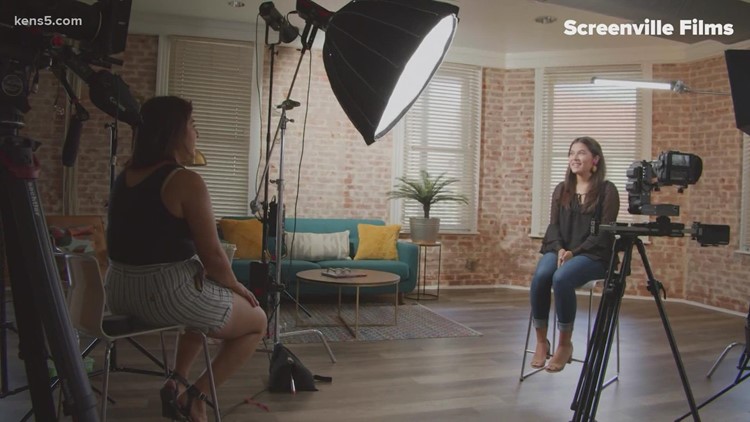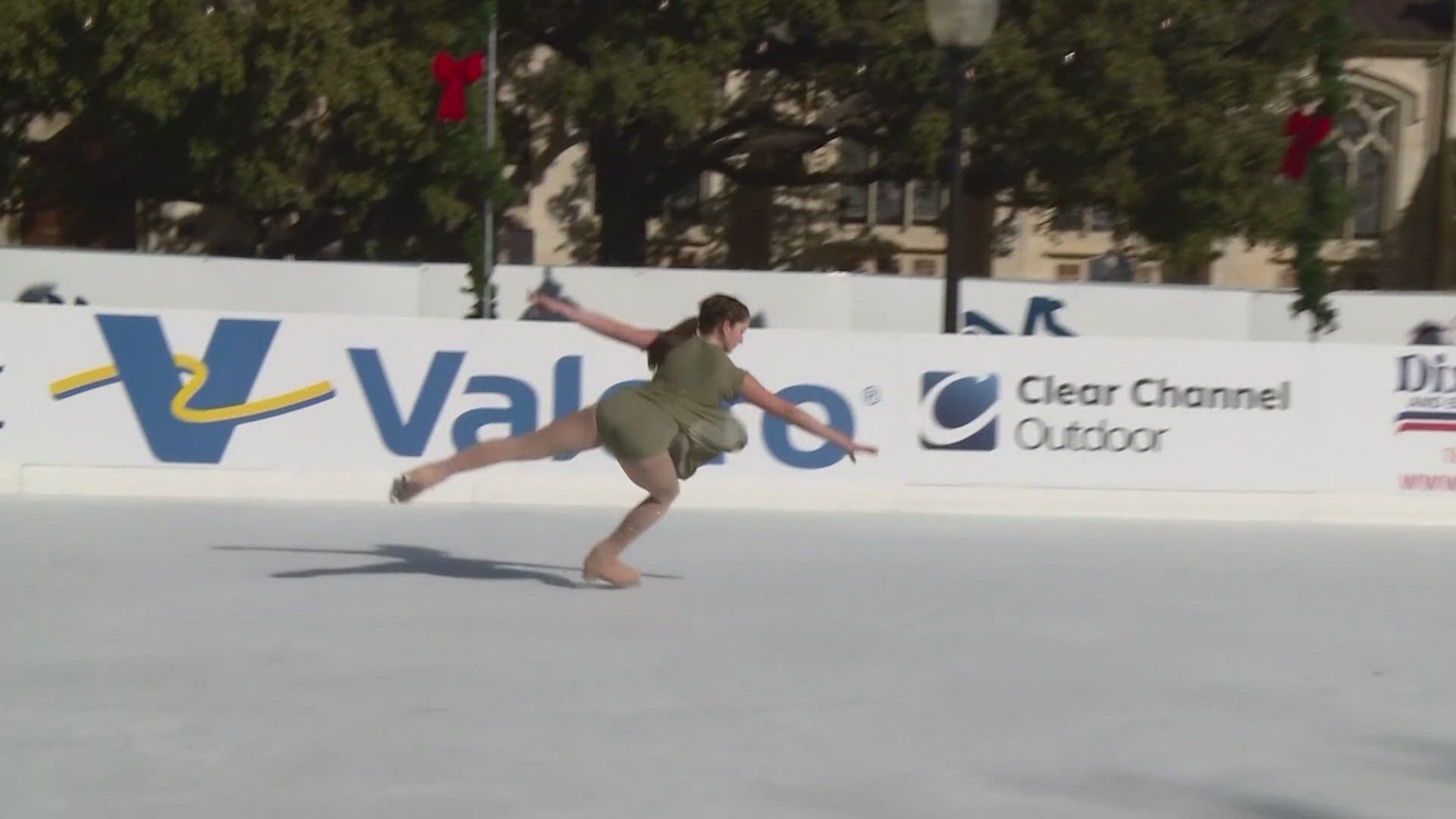SAN ANTONIO — For the third year in a row, San Antonio can boast that it's among the best places in the country for filmmakers to live and work, according to MovieMaker Magazine.
The 22nd-best large city, to be exact. The Alamo City retained that spot in the annual ranking, which was released this week and cites the city's photogenic beauty, diverse locales and low cost of living as major reasons creatives continue coming to town.
Krystal Jones, executive director of San Antonio's Department of Arts and Culture, highlighted another big factor: the return of the city's supplemental film incentive, which, stacked on top of other tax breaks, makes it even harder for filmmakers and studios to pass up San Antonio. It provides up to $250,000 in rebate dollars for approved projects based in San Antonio for at least 60% of their production days (among other requirements).
City officials shelved the program in 2020 amid the pandemic before reinstituting it last October.
"As soon as we launched it, that week was when we had our first application," Jones said. "Filmmakers are looking for that incentive. So we are going out the gate marketing that program."
The city also continues to tout the sheer range of locales available for shooting in and around San Antonio, from the lush Hill Country to the urban personality of downtown to the postcard-ready sights along the River Walk.
Texas cities crowd the bottom portion of the MovieMaker list, with Fort Worth, Houston and Dallas also appearing in the 20 through 25 slots. Austin was the highest-ranked Texas city, at 12. Atlanta snatched the top spot in MovieMaker's big-city ranking this year from Albuquerque, while Santa Fe was named the best small-city filmmaking destination.
Many a major project has filmed in the metro over the past 12 months, including the Luis Fonsi romcom "Answer to My Prayer" and the nationally televised Dia de Los Muertos River Parade. That San Antonio also prioritizes historic preservation only widens the scope of movies and shows that can be filmed here.
"Anytime San Antonio is on film, especially on a national level, that's just another feather in our cap. Another way for people to say, 'Wow, look how beautiful that city is,'" Jones said.
Her department is better-equipped than it was a year ago to do its part, too. The San Antonio Film Commission is back to being fully staffed, which means it can more easily accommodate those seeking film permits in a process that is more streamlined here than most other cities. Available shoot locations can also be scouted ahead of time via an online directory.
"We have an amplified message, an amplified voice," said Jones, who cites an upcoming visit by WWE Royal Rumble as one major 2023 event that includes aspects of getting the city on camera. "We're ready to get out there and tell filmmakers we are open for business."
For local filmmakers, San Antonio has its pros and cons
For the filmmakers born here and still looking to break through, the Alamo City is a filmmaking destination of compromises. It's far more affordable than Hollywood, but provides far from that California hub's wealth of opportunities. Its community is tight-knit, but not always big enough to contain the right connections. It's not uncommon for big projects to bypass San Antonio for Austin, but on the other hand Austin is just a short drive away.
"There's plenty (of opportunities) if you connect with the right people," said Carolina Marie. "But Austin and Dallas have much bigger-budget projects."
Adds Denise Crettended: "We have amazing crews in San Antonio. I'd put them on the same level of anywhere else I've worked."
Every once in a while a San Antonio-born filmmaker gets accepted to a Sundance or South By Southwest – like April Maxey and her award-winning short "Work" – putting them on the fast-track to bigger budgets and brighter spotlights. For those still in the early stages of their career, more and more local production houses are being created to foster their skills and the community, along with new film programs at UTSA.
Even those who are able to go to film school in Los Angeles, like San Antonio native Abigail Trevino, need to have the passion to marshal their tools and create a movie—while dealing with potential stigmas along the way.
"As a Latina filmmaker, it's pretty tough in the industry," said Trevino, who graduated last fall with a degree in cinematography and is producing a feature with her fiancé titled "The American Coyote." "I wouldn't say San Antonio is not great, but it has lots of potential. If people know the right people, then you can build something great."
Meanwhile, there's inconsistency among local filmmakers when it comes to the incentives that are available to them, while most echo MovieMaker's sentiment about the geographical diversity.
Others say it takes scandal for a locally produced film to be covered in San Antonio’s news media while dozens of others don’t receive similar attention.
“There are some very talented filmmakers here in SA that do not get to shine because they lack support from the local media or community,” said Rogelio Salinas. “Society as a whole focuses their attention on what is controversial (than) what is substantial, but that’s what sells nowadays.”
Even if acceptance into major festivals eludes them, Alamo City talent continues to find audiences at locally curated festivals like the Latinocentric CineFestival and the San Antonio Film Festival. (Animalis Fabula, meanwhile, moved here from Austin last year and hopes to cultivate new appreciation for animal-based cinema.)
Spotlighting local filmmakers is what Adam Rocha has worked to do for nearly 30 years, ever since he founded the San Antonio Film Festival in 1994. Twenty-nine years later, he's still the festival's executive director—and still motivated to show how much talent continues to bloom here.
"On any given day on social media you can see numerous San Antonians posting their newest short films or photos of their films in production," says Rocha, an educator who helped launch UTSA's new film program last spring.
At the same time, Rocha also believes the city could "do so much more," and wonders if a downtown sound stage like the one being planned in Bastrop wouldn't do more for the city in the long-term than relocating the Missions' baseball stadium there.
Regardless, he's hopeful for the future and for more local directors who will eventually emerge, whether in the eyes of their neighbors or of cinema audiences across the country.
"I look forward to our city's future cinema in San Antonio," Rocha says.
>TRENDING ON KENS 5 YOUTUBE:



